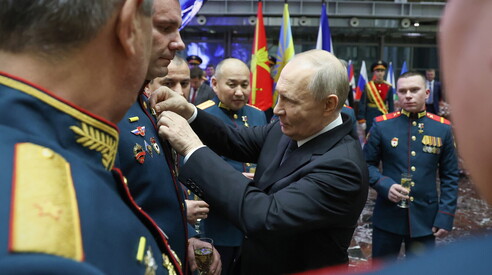
Il Foglio investigation
Chinese policemen in Italy: from joint patrol to a virtual police station
The China-Italy joint patrols (now suspended due to Covid) were not enough. Now there is also a "Fuzhou Overseas Police Station" in the Tuscan city of Prato
Rome, Italy. For the past few weeks, a brand-new service has been promoted on Chinese messaging app WeChat's groups dedicated to Chinese citizens in Italy. In a message in late March, the opening of the Fuzhou Overseas Police Service Station located in the city of Prato in Tuscany region was officially announced. Fuzhou is the capital of China's Fujian province, which is the second place of origin of Chinese immigration to Italy (the first group is from Zhejiang province, immediately north of Fujian).
The press release states that "the Fuzhou Overseas Police Service Station" was established with the purpose of "facilitating Chinese residents in Italy to handle various domestic affairs" and it is based in Via degli Orti del Pero 2, the same address of the headquarter of the Cultural Association of the Fujian Chinese Community in Italy. The article is accompanied by some pictures: one shows Liu Bingzhi, president of the association, sitting next to other representatives of the association and in front of a sign that reads, in Chinese and English: "Fuzhou Police Overseas Service Station." In another photograph there is a Chinese citizen connected virtually via webcam to a police officer in Fuzhou, and a third screen can be seen in which there are photographs of an ID, presumably of the same citizen. The Prato station is publicized mainly for this: the Chinese can apply for a new driver's license simply by going to Via degli Orti del Pero, and without being forced to return to China. Because of the Zero Covid policies China is still very difficult and expensive to reach.
Prato is home to the second largest Chinese community in Italy, and Via degli Orti del Pero is the community's administrative and business center. But it is not the only detachment that Fuzhou law enforcement, and in particular the department responsible for policing the Chinese diaspora, has opened: Liu Rongyan, Director of the Police and Overseas Chinese affairs office of the Fuzhou Public Security Bureau Office, announced in late January the opening of 30 similar stations in 25 cities in 21 different countries. From Barcelona to Budapest, from Dublin to Buenos Aires, the "Overseas 110" operation is heralded by statements that emphasize its administrative utility, but the authority behind it is not connected to the usual activities of the Chinese consulate or embassy, instead the offices are directly connected to the Fuzhou security forces.
Suspicions also emerge from reading the local media: an article published on Feb. 17 in The Paper, a newspaper of Shanghai United Media Group, tells the story of Ms. Wang, Chinese citizen resident in Canada, who approached her city's Fuzhou Overseas Police Station because she had been victim of online fraud. "We treat every complaint to the overseas police as if it were a complaint to the domestic police, and we are committed to resolving the case as soon as possible to satisfy the victims," said Li Lianghang, deputy chief of the Taijiang District of Fuzhou City and director of the Public Security Bureau at the Fujian People's.
All of these cases show that the Fuzhou police is not just an administrative office, but it may also works as intelligence-gathering and criminal report office directly involving the Chinese police.
According to Il Foglio, Italian authorities have not been officially notified of the opening of the "Fuzhou Overseas Police Service Station." Reached by Il Foglio, the Italian police explained that the office is not of particular concern because it "only deals with administrative practices and not public security." In the latter case, the presence of a Chinese police office on Italian soil would be illegal. According to NGO and previous media investigations, authoritarian countries such as China have long used their law enforcement agencies intended for citizens abroad to control dissidents, pressure those who flee the country, and as a deterrent for those who would want to escape. The Party and authorities have eyes everywhere, the Chinese propaganda posters say.
Italy has also long been at the center of controversy for another operation. Italy is one of the very few countries in the world, certainly the only one in the G7, that has partnered with Chinese security forces for periodic joint patrols over their respective territories. Sometimes Italian carabinieri or policemen go to China, sometimes Chinese policemen come to Italy - they have been to Rome, Prato, Milan, Turin, and Padua. The joint patrols are now suspended because of the pandemic, but they have been going on until 2019. The agreement dates back to 2015, when the director-general of the Department for International Cooperation of the Chinese Ministry of Public Security, Liao Jinrong, and the deputy director-general of Italian public security, Prefect Antonino Cufalo, with the presence of then-Police Chief Alessandro Pansa signed an agreement in The Hague "for the execution of joint patrols in areas of tourist interest." After several official requests, Il Foglio was unable to obtain the text of that agreement.

Ci conviene essere maialini coraggiosi





